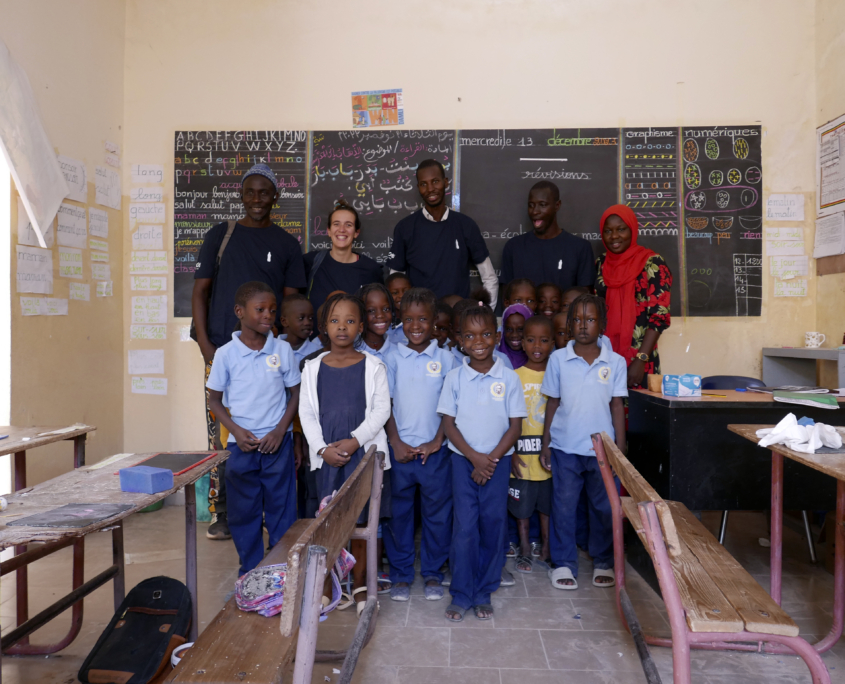Education for Sustainable Development: The Renken Onlus Story
 In 2006, a transformative journey began when a group of young friends, inspired by a chance encounter in Senegal, decided to establish Renken Onlus. Emerging from a serendipitous idea to fight global poverty through education, it led to the simultaneous creation of sister associations in Italy and Senegal. Claudia Nicola, the president, reflects on its dual foundation: “It all started somewhat by chance, sparking a shared mission to empower communities.” Education for sustainable development became a central theme of its mission.
In 2006, a transformative journey began when a group of young friends, inspired by a chance encounter in Senegal, decided to establish Renken Onlus. Emerging from a serendipitous idea to fight global poverty through education, it led to the simultaneous creation of sister associations in Italy and Senegal. Claudia Nicola, the president, reflects on its dual foundation: “It all started somewhat by chance, sparking a shared mission to empower communities.” Education for sustainable development became a central theme of its mission.
At the moment, Renken Onlus embodies a pioneering approach to education for sustainable development that extends beyond traditional classrooms, aligning closely with UNESCO’s global citizenship education (GCED) framework. By integrating these principles, which focus on preparing learners for inherently global challenges, the organization’s initiatives promote a sense of interconnectedness across cultures and geographies.
From scholarships to cultural integration and ecovillage development, Renken has unveiled a spectrum of projects that not only illuminate the path to sustainable development but also exemplify the profound impact of integrating education with actionable change across communities.
Local Leadership and Sustainable Development
Central to Renken’s success is its commitment to local leadership and community-driven initiatives. Ms. Nicola emphasizes the importance of equality in partnership and the avoidance of external imposition, ensuring that “everything is managed by the very communities they aim to support.”
This approach has led to significant strides toward financial autonomy, with a noteworthy shift from reliance on international funding to substantial local support, underscoring the effectiveness of local management in fostering sustainable outcomes. The World Bank and OECD recognize the impact of community-driven development and local empowerment as crucial to achieving sustainable development goals.
3 Community-Driven Development Goals
- From Scholarships to Building A School in Malika. In Malika, a suburb of Dakar, Renken Onlus has made remarkable strides in improving educational access and quality. From initiating scholarship programs to constructing a school managed by the local Senegalese Renken, the organization has established a sustainable framework for long-term academic support, even welcoming internships for teachers from other nations and student exchanges (despite critical challenges with the current VISA system). Renken embodies the global recognition of the importance of family engagement and comprehensive support systems in achieving sustainable development and economic independence – as highlighted by the National Association for the Education of Young Children (NAEYC) and UNICEF. Renken’s holistic approach to education for sustainable development extends to building strong family relationships and providing comprehensive support systems – including health and welfare assistance such as mosquito nets, mattresses, microloans and rent assistance, to ensure that economic challenges do not hinder educational development. “We personally know all 100 children…as well as all 40 mothers and all 40 fathers,” Ms. Nicola shares.
- Cultural and Culinary Integration in Turin. Meanwhile, Renken promotes African culture and cuisine in Turin. “We began by wanting to bring a more truthful image of Africa to Italy than what is commonly portrayed. We started inviting artists of various types, filmmakers, musicians, writers, to tell their own stories about the Africa everyone talks about.” The Jigeenyi circle was born from these cultural events, offering professional cooking training to African women and organizing cultural festivals. These initiatives not only facilitate job integration but also challenge stereotypes, promoting a nuanced and authentic perspective of African cultures. “Another objective is job integration and inclusion” through professional training courses mainly for foreigners, especially Afro-descendant women. This constitutes a crucial step in the current cultural diplomacy framework, whereby fostering cultural understanding via place-based arts and cultural practices, or creative placemaking, plays a crucial role in driving economic independence and leadership, employing education for sustainable development. In fact, it is by highlighting the economic significance of cultural diplomacy and creative industries that Renken’s initiatives support job creation and gender equality.
- The Ecovillage and Agroecology. Since 2017, Renken’s ecovillage in southern Senegal has intertwined tourism, job creation and environmental sustainability. This project, in a region called Casamance, not only fosters job opportunities and practical training in sustainable agriculture but also enhances awareness through immersive experiences that differ markedly from typical tour operator offerings. Aligning with the United Nations Environment Programme (UNEP) efforts to embed environmental sustainability within the Sustainable Development Goals (SDGs), Renken is set to demonstrate the crucial role of environmental stewardship in holistic development. By engaging in activities like agroecology and the cultivation of Moringa—a plant heralded for its nutritional properties against malnutrition—Renken extends its educational mission. “In Senegal, malnutrition is not due to lack of food but to lack of food variety”: the initiative addresses malnutrition with innovative solutions, serving as a permanent training center for sustainable practices and offering practical lessons in sustainable agriculture that resonate with a growing European interest in agroecology.
Looking Forward
Renken’s model offers a compelling blueprint for development that prioritizes economic independence, local leadership and sustainable growth. By centering the voices and leadership of those directly impacted, Renken not only addresses immediate needs but also lays the groundwork for long-term resilience and empowerment, demonstrating how innovative educational strategies can address the multifaceted challenges of global poverty and foster interconnected, sustainable communities.
As the organization looks to the future, making the ecovillage independent and stabilizing the new school in Malika, its commitment to education for sustainable development and community empowerment remains a guiding light. In an interconnected world, Renken stands as a testament to the transformative power of education in building more equitable communities.
– Matilde Liboni
Photo: Courtesy of Renken Onkus
